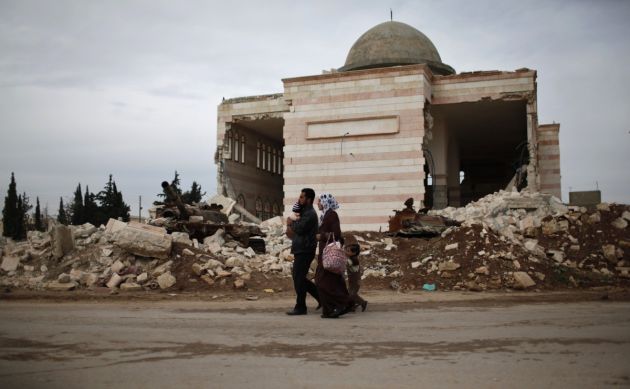Human Rights Watch: opposition destroy Syrian religious sites

Human Rights Watch says armed opposition groups appear to have deliberately destroyed religious sites in mixed areas of Northern Syria during the last two months of 2012.
This followed investigations in Latakia and Idlib governorate, the rights group said in a statement on Wednesday.
"An armed opposition group destroyed a Shia place of worship in Idlib governorate, and two Christian churches in Latakia governorate were looted," said Human Rights Watch.
"The destruction of religious sites is furthering sectarian fears and compounding the tragedies of the country, with tens of thousands killed," said Sarah Leah Whitson, Middle East director at HRW.
"Syria will lose its rich cultural and religious diversity if armed groups do not respect places of worship. Leaders on both sides should send a message that those who attack these sites will be held accountable."
Sunni Muslims account for more than 70 percent of Syria's 22 million people with other Muslims making up around 16 percent and Christians 10 percent.
HRW said its evidence suggest the attacks took place after the area fell to opposition control and government forces had left the area.
"While some opposition leaders have pledged to protect all Syrians, in practice the opposition has failed to properly address the unjustified attacks against minority places of worship," HRW said.
"The opposition also has failed to rein in gunmen engaging in looting and other criminal activities, like kidnappings. Human Rights Watch urged armed opposition groups to protect all religious sites in areas under their control and to discipline members who loot or kidnap."
Most reports of atrocities in Syria have been singled out the regime of President Bashar al-Assad.
UN High Commissioner for Human Rights, Navi Pillay, a former South African judge, had said on Jan. 18, "I firmly believe that war crimes and crimes against humanity have been committed, are being committed and should be investigated.
"I have urged the Security Council to refer the situation to the International Criminal Court for investigation of war crimes and crimes against humanity on the part of all parties engaged in this conflict," she said.
Switzerland drew up a petition for such an investigation supported by 58 countries.
The 15-member UN Security Council is the only body that can refer the petition to the ICC. But Russia and China have used their veto several times to block resolutions which would have threatened sanctions against the Syrian regime.
On Jan 7, Pope Benedict in his yearly address to representative of 179 States lamented the situation in Syria which he said is being "torn apart by endless slaughter and the scene of dreadful suffering among its civilian population".
The pope urged an end to the killing before the entire country becomes "a field of ruins."
In September 2012, the World Council of Churches said that governments and civil society have a duty to protect the lives and dignity of all citizens.
"This basic obligation is clearly stipulated under international human right law according to the Geneva Conventions, which stipulates that even during conflicts, indiscriminate attacks on civilians by any party are not acceptable, and that combatants and non-combatants must be strictly distinguished," said the WCC's main governing body, its central committee.
The council noted that Christians in Syria, as well as in the whole Middle East region, are indigenous and rooted to local traditions.
"The churches in Syria, which are deeply rooted in the land, and have developed a long historic experience of engagement in the life of the society will have an important role in national dialogue especially in this critical and difficult moment," said the WCC.
The Committee to Protect Journalists said that in 2012 Syria was the most dangerous country for journalists with 28 killed.
More than 60,000 people have died in the Syrian civil war since it began in March 2011, while the UN expects the number of Syrian refugees to nearly double by June to 1.1 million people.